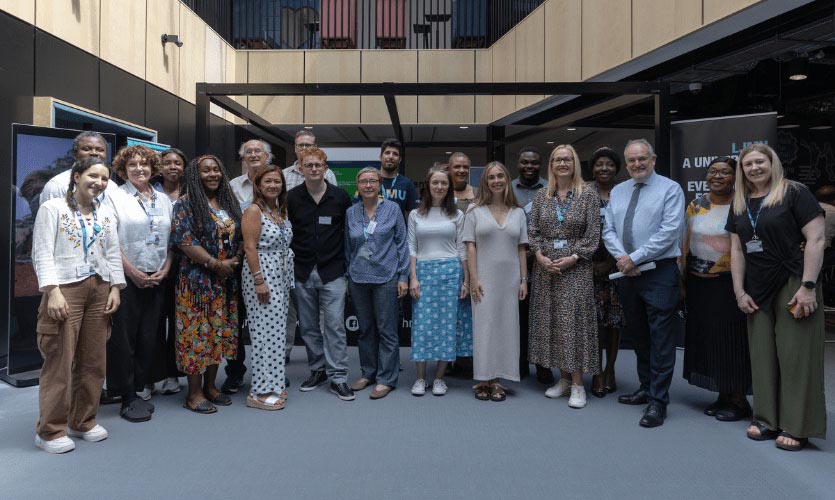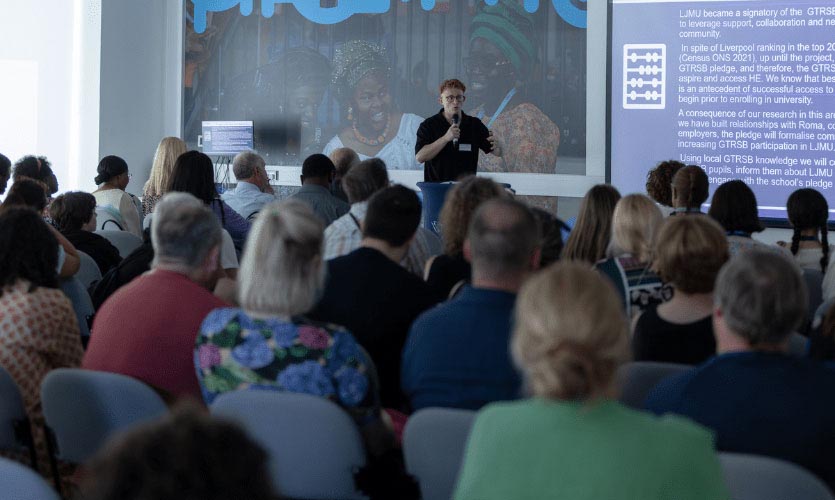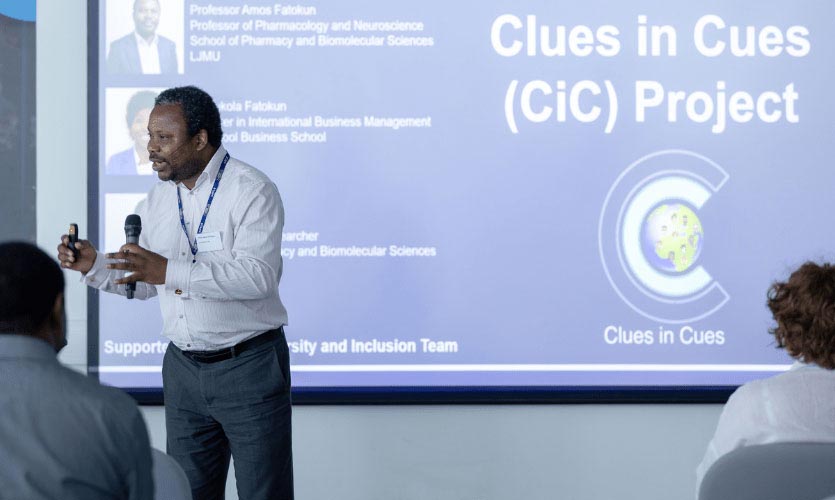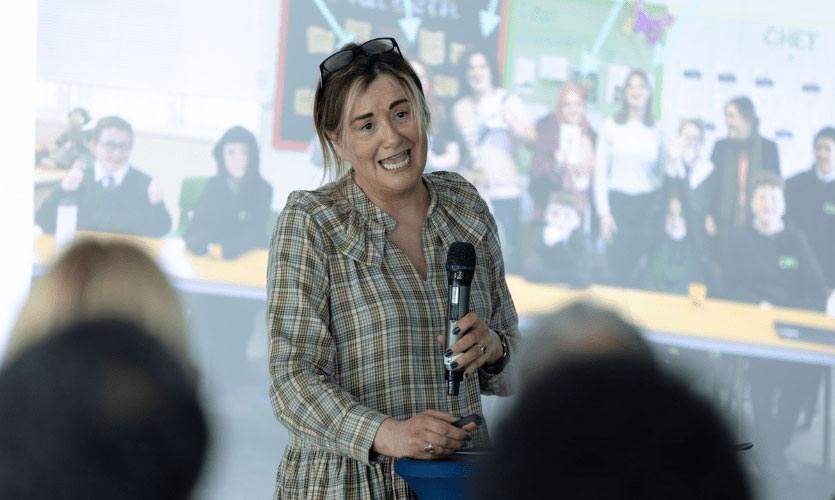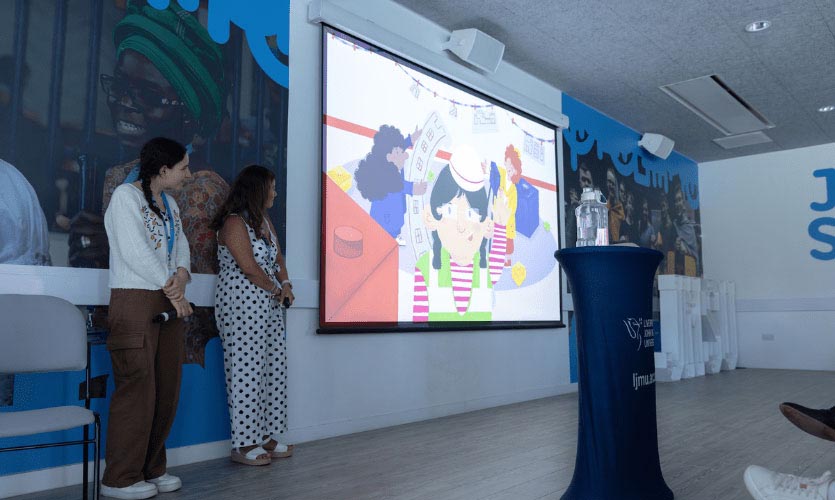Nine funded projects combat discrimination and inequality
The impact made by nine LJMU research projects has been celebrated at an event on campus
Over the past year, nine projects have been funded by the university and led by LJMU staff, to combat discrimination and inequalities, raise awareness of related issues and encourage best practices at the university in diversity and inclusion.
The event was opened by Associate Director, Moni Akinsanya and Director of HR, Tina Purkis.
Vice-Chancellor, Professor Mark Power also attended the celebration event and commended the projects for their impact on diversity and inclusion at the university.
The members of staff and projects celebrated at the event and their impacts include:
-
Using the Gypsy, Traveller, Roma, Showmen and Boaters' (GTRSB) HE and Schools Pledge to increase Liverpool GTRSB into FE and HE.
Led by Dr Helen Collins and Sheldon Chadwick. LJMU is one of the only universities in the North West to sign the GTRSB pledge. The university recently held an event on campus in June 2024 to invite over 200 attendees from the GTRSB community and experience what university life is like. The project has also reached out to schools/colleges across the district to create a database of where GTRSB students are studying and encourage the schools and colleges to sign up to the pledge.
-
Lean in Construction for Gender Equality.
Led by Dr Denise Lee. The projects aim is to help women achieve their ambition and inspire girls to consider a career in construction. The project hired a graphic design and illustration student intern to create an animation that could be used in outreach to encourage girls to consider careers in the field.
-
Understanding Barriers to Academic Achievement of Male Students from Low HE Participation Areas and Developing Institutional Interventions.
Led by Dr Elena Zaitseva. The project has looked into white, male and first-in-family who are often a forgotten intersectionality. Research found many of these males are reluctant to challenge themselves, can be unwilling to admit they don’t understand course criteria or requirements and can often get bored a lot easier than their female counterparts. A full report into the findings will be released so that the findings can be used across the university.
-
‘Story Creators’ - A collaborative inclusion project for LJMU students and pupils in the Liverpool City Region (LCR) with Special Educational Needs and Disability (SEND).
Led by Dr Ceri Daniels and Dr Nicky Hirst. APSS students worked with local pupils with special educational needs and disabilities to produce their own book celebrating difference and the richness of diversity in ‘Being Human.’ ‘Intern to Work’ - A collaborative inclusion project for LJMU to partner with Liverpool City Council (LCC) to provide supported internships to students in the Liverpool City Region (LCR) with Special Educational Needs and Disability (SEND).
-
'Intern to Work' - A collaborative inclusion project for LJMU to partner with Liverpool City Council (LCC) to provide supported internships to students in the Liverpool City Region (LCR) with Special Educational Needs and Disability (SEND).
Led by Paula McNulty. In the North West only 4.1% of young adults (age 16 to 25) with a learning disability are in work. Five mentors at LJMU were matched with five individuals with disabilities from the Liverpool City Region. The project with highly successful with one of the individuals having now decided to go into higher education and will join LJMU as a student in September.
-
#BlackintheIvory.
Led by Dominique Walker. The project has worked with 30 Black academics on creative writing projects to articulate their experiences and focus on conscious healing strategies. The project has resulted in a permanent exhibition which will be hosted in the John Lennon Art and Design and a podcast is due to launch.
-
Clues in the Cues - Chronicling and Contextualising Non-Western Socio-Cultural Norms for Improved Student Experience.
Led by Professor Amos Fatokun. The research is looking into understanding differences in cultures which may affect the student experience for many non-western or ethnic minority students. These differences in cultures, such as not using eye contact to those more senior or discomfort in using first names can have a negative effect on a student’s experience. The research will aim to create new best practice guidelines and increase understanding across the university.
-
You Can't Be What You Can't See.
Led by Sarah Williams. The project matched 12 ethnically diverse HR students with ethnically diverse HR professionals working in the Liverpool City Region in a mentorship programme aiming to address the issue that students often ‘can’t be what they can’t see.’
-
The Experiences of Disabled Staff within a Higher Education Setting.
Led by Simon Ward. The project aims to understand the experiences of disabled staff working at the university and what can be done to improve that experience. Research from the project has shown that many staff members with a disability choose not to disclose sometimes due to fear of being disadvantaged or feeling embarrassed.
The research continues and project lead Simon Ward is looking to interview disabled staff about their experiences of working within higher education. Staff members can get in touch (opens in a new tab) directly if they would like to be involved. The survey also remains open until 17 July for staff to fill in.
You can find out further details about all the projects on the Diversity and Inclusion Funded Projects page.
Apply for the Diversity and Inclusion Fund 2024/2025
Do you have a great idea for a project that will make a difference? The university is launching the next round of the Diversity and Inclusion Fund. Seven projects will be funded and applications can bid for project funds up to the value of £10,000.

